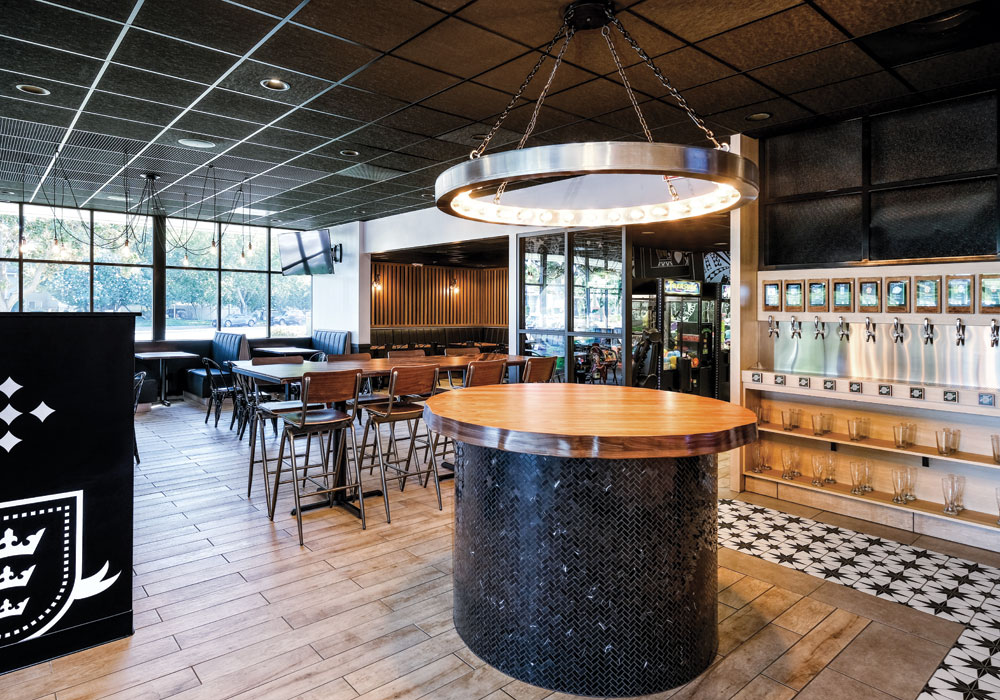In a competitive industry like foodservice, company culture can often be the differentiating factor between thriving and failing businesses, and that’s no different at the franchise level. But data shows that many companies don’t focus on culture as much as they should: A 2015 Gallup survey found that only 28 percent of employees strongly agree with the statement “I know what my company stands for and what makes our brand(s) different from our competitors.”
Jenn Johnston, president and chief brand officer of Global Franchise Group (GFG)—parent to concepts like Great American Cookies, Pretzelmaker, Marble Slab Creamery, and Round Table Pizza—says the cultural element of a business usually gets overlooked in favor of other aspects.
“A lot of people don’t focus on [culture]. I think they focus more on the business at hand and achieving different strategies and tactics,” Johnston says. “And then culture could be an afterthought instead of a forethought.”
“If you start with culture,” she adds, “the rest follows.”
GFG prioritized company culture a decade ago, she says. At the forefront of its brand-building architecture, the group provides franchisees with a consistent mission and core values, and then holds everyone accountable to those values.
Johnston points to Great American Cookies, which has a clear brand mission of sharing the fun of cookies. From that mission statement, franchisees can interpret the meaning within their own stores, especially in how they utilize their employees.
Measuring the success of a company culture may not be as easily quantifiable as sales figures, but metrics such as customer reviews can indicate if a franchisee is building a good culture. Employee retention is another way to see if people feel loyal to the brand, which translates to productivity down the line.
GFG surveys also ask franchisees about core values and franchise trust, which helps the company assess whether franchisees are delivering on its goals.
Franchise expert Scott Greenberg, author of The Wealthy Franchisee, has worked with GFG to help its franchisees maximize their potential. A former Edible Arrangement owner/operator, Greenberg says franchisees can create a successful culture by taking measures like delegating tasks properly.
He points to a presentation he gave to a group of franchisees where he asked participants to envision their ideal annual salary and divide it by hours worked in a year. He then asked those same participants if they would pay someone that hourly amount to do the task, when they could instead delegate it to someone else.
“I said, ‘All right, would you pay someone that much money to wipe down the counters? Would you pay someone that much money to do things that you could get someone else to be doing for $12 or $15 an hour?’” The idea is, if you can really create culture and be very sophisticated about building the mindset of your individual employees and building great teams, then they can take care of those operational tasks,” Greenberg says. “The more quickly a business owner can make that shift to get out of the weeds, they get into the stuff that really matters.”
Often, a franchisee’s success is chalked up to the coincidence of a great location or their workaholic nature. But these operational pieces are just a start; good marketing and cost control are table stakes for running a good business. What Greenberg found in successful franchisees—whether they frequented the store every day or took frequent vacations—was their ability to understand the human element.
“You don’t just hire people. You hire the right people who are a fit for the values of your workplace,” he says. “Then you don’t just train them in the skill part of it. You also train them in the culture itself and you train them in their mindset.”
Understanding the human element is especially important for franchisors who wish to trickle culture down from the corporate level. And Tropical Smoothie Cafe CEO Charles Watson is someone who embodies that mindset to a T.
Watson joined Tropical Smoothie Cafe’s franchise team in 2010, when the chain had 300 units. Over the past 11 years, the chain’s reach has multiplied three times over, which Watson partly attributes to the smoothie brand’s prioritization of company culture. The foundation of Tropical Smoothie’s culture lives in the acronym T.R.U.S.T. (transparent, responsible, unique, service-oriented, and tenacious), which serves as a baseline for franchisees.
To take the business partnership beyond a series of acronyms, Watson often travels to establish a face-to-face connection with Tropical Smoothie Cafe’s franchisees. He says the emotional connection between the franchisor and franchisee is critical in creating purpose-driven franchisees who feel good about their bottom line and the impact they’re having in their communities.
He compares the relationship between the franchisor and franchisee to that between the head and the heart. With a strong connection between franchisors and franchisees, both are more equipped to handle whatever obstacles inevitably occur in the business realm.
“At the end of the day, we’re human beings and we have to be able to work through problems,” Watson says. “We have to have some sort of North Star that aligns us and some similarities to make decisions, because ultimately there will be conflict. There will be good times and bad times and culture allows you to get through those times.
“So I think that’s incredibly important going forward, because everything is a negotiation in business,” he adds. “Making sure that you’re singing from the same choir book as a baseline is incredibly important to be efficient and effective in driving the business forward.”









